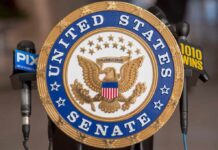
A case that may be heard by the U.S. Supreme Court has the potential to positively affect hundreds of defendants prosecuted for their involvement in the Jan. 6 protest.
One of the accused, Edward Jacob Lang, is asking the high court to hear his challenge to one of the charges he was indicted on. Specifically, he wants justices to review his charge of obstruction of an official proceeding.
That proceeding, of course, was Congress certifying the Electoral College to confirm the results of the controversial 2020 presidential election.
JAN 6 PRISONER – EDWARD JACOB LANG -TAKES OBSTRUCTON CHARGE TO THE SUPREME COURT
Mr. Lang says the Biden administration is intentionally twisting the law into a weapon against those who support former President Donald Trump. The SCOTUS filing, he says, is “bigger than J6, and… pic.twitter.com/wszxHbZ8QE
— BelannF (@BelannF) July 16, 2023
Lang was also charged with assaulting, resisting, or impeding certain officers or employees, civil disorder, accessing a restricted building or grounds, and violent entry or disorderly conduct.
In last week’s appeal to the Supreme Court, the defendant asserted that the obstruction charge was overly broad. He said it could be used to persecute anyone who is part of “a public demonstration gone awry.”
Lang’s attorneys argued that charging their client with obstruction “is nothing less than the weaponization of the penal code to stifle dissent; it sets a terrifying precedent unworthy of this nation’s history.”
The defendant has been on a legal seesaw over the obstruction indictment. His earlier motion to dismiss the charge before his trial was granted by the D.C. District Court. That reprieve was short-lived, however, as an appeals court reversed that decision and rejected a motion for rehearing.
Norman Pattis is Lang’s attorney. In an interview with Newsweek, he noted that charges involving hundreds of defendants could be affected by this legal effort. “The government misuse…of the federal penal code in the (Jan. 6) cases is shocking.”
The specific statute used by the federal government applies to a person who “corruptly alters, destroys, mutilates, or conceals a record, document,” or “otherwise obstructs, influences, or impedes any official proceeding or attempts to do so.”
Lang’s legal team believes that he did not meet the “corrupt” specification and that previous interpretations created “unsettled significant issues.”
Whether this case will be good news for hundreds of defendants depends on whether the Supreme Court will even hear arguments as well as how it rules if it does. Lang’s supporters believe the high court may hear the case this fall.



























